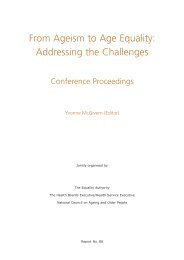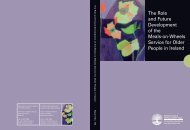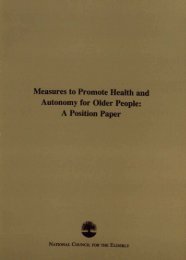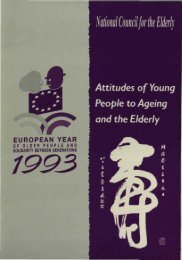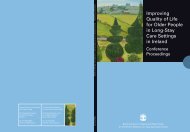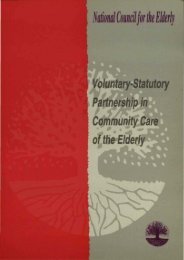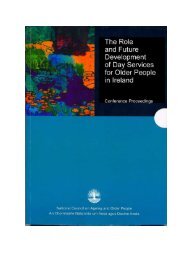Improving Quality of Life for Older People in Long-Stay Care ...
Improving Quality of Life for Older People in Long-Stay Care ...
Improving Quality of Life for Older People in Long-Stay Care ...
- No tags were found...
Create successful ePaper yourself
Turn your PDF publications into a flip-book with our unique Google optimized e-Paper software.
each method used at the same po<strong>in</strong>t <strong>in</strong> time or sequentially (Creswell, 2003).There are two types <strong>of</strong> mixed method research; with<strong>in</strong> method and across method(Denz<strong>in</strong>, 1989). With<strong>in</strong> method research <strong>in</strong>volves the use <strong>of</strong> two or more methodswith<strong>in</strong> a research paradigm, while across method research <strong>in</strong>volves the use <strong>of</strong>two or more methods across research paradigms. As this study used qualitativeand quantitative methods and part <strong>of</strong> the qualitative data collection and analysispreceded the quantitative data collection and analysis, the study is categorised asan across method sequential exploratory design. This design was chosen becauseit gave the best means <strong>of</strong> explor<strong>in</strong>g the research problems.Three methods were employed with<strong>in</strong> this study: focus groups; quantitative survey<strong>of</strong> long-stay facilities and qualitative <strong>in</strong>terviews with residents and staff.4.3 Focus Groups with Managers/ProprietorsFocus group <strong>in</strong>terviews and analysis were undertaken prior to other data collectionas they <strong>in</strong><strong>for</strong>med the development <strong>of</strong> the survey <strong>in</strong>strument and provided, alongsideliterature review, contextual <strong>in</strong><strong>for</strong>mation on factors that <strong>in</strong>fluence residents’ quality<strong>of</strong> life and care provision <strong>in</strong> general. Focus groups enabled important background<strong>in</strong><strong>for</strong>mation on quality issues <strong>in</strong> long-stay care to be gathered. Seven focus groupswere held with managers/proprietors <strong>of</strong> long-stay facilities. A purposeful, stratifiedsampl<strong>in</strong>g strategy was employed to ensure that representatives from the five types<strong>of</strong> facilities (geriatric hospital/home, health board district hospital/community hospital,health board welfare home, voluntary geriatric home/hospital and private nurs<strong>in</strong>ghome), the three sectors (public, voluntary and private) and a mix <strong>of</strong> facilities (large,small and geographical sett<strong>in</strong>g) were <strong>in</strong>vited to participate. Managers <strong>in</strong> thesesett<strong>in</strong>gs were contacted by telephone and <strong>in</strong>vited to attend a focus group; 35 nursemangers were <strong>in</strong>vited to each focus group with the assumption that 10-15 managerswould attend. Letters outl<strong>in</strong><strong>in</strong>g the purpose <strong>of</strong> the study and the goals <strong>of</strong> the focusgroup were sent to nurse managers/proprietors who expressed an <strong>in</strong>terest <strong>in</strong>attend<strong>in</strong>g. The purpose <strong>of</strong> the focus groups was to identify quality <strong>of</strong> life issueswith<strong>in</strong> long-stay facilities, as perceived by managers/proprietors, and to use this<strong>in</strong><strong>for</strong>mation to <strong>in</strong><strong>for</strong>m the data collection process through the survey <strong>in</strong>struments.In all, seven focus groups were held: three <strong>in</strong> Dubl<strong>in</strong>, two <strong>in</strong> Galway and one <strong>in</strong>Cork and <strong>in</strong> Donegal. The distribution <strong>of</strong> participants is detailed <strong>in</strong> Table 4.1 below.81







